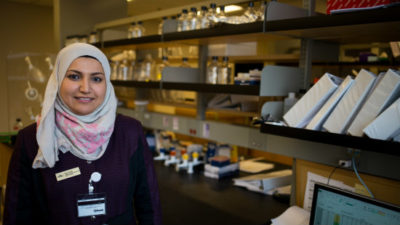UMKC Ph.D. student was stuck in Libya after travel ban executive order
Ph.D. student Fatma Abdalla walked toward the airport gate in Tunisia, ready to board her flight back to Kansas City and her studies at UMKC. She handed the clerk her U.S. visa — and was halted.
“You can’t go back,” she was told. “Not now.”
Suddenly, it rushed back to the fore: The news she had heard, was dumbfounded by and had suppressed. More than just her studies awaited her return to Kansas City. So did her husband and three young children. And she had no way back.
She broke down in tears.
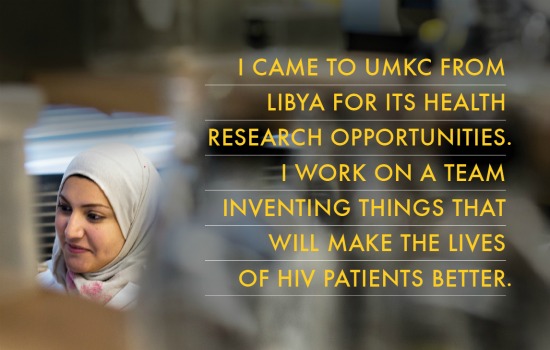
Five years ago, Abdalla, her husband and their infant daughter moved to Kansas City from Libya so she could fulfill her dream of earning a Ph.D. She had read about UMKC and its outstanding health research.
“I knew it was where I wanted to be,” said Abdalla, who finished a master’s degree in Cell and Molecular Biology from the School of Biological Sciences and is working on her Ph.D. in Pharmacology and Toxicology at the School of Pharmacy. “I want to help people.”
Abdalla’s younger sister wanted her help with her wedding. So in January, Abdalla flew 6,100 miles from Kansas City to Libya. Her husband, also a student at UMKC, stayed at home with their two sons, ages 2 and 4, and daughter, now 6.
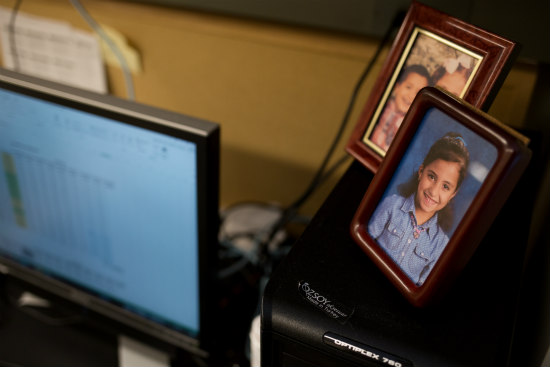
Abdalla’s children are growing up in Kansas City.
She was enjoying time reuniting with her parents and siblings when they learned about the news Jan. 27. President Donald Trump had signed an executive order on immigration titled “Protecting the nation from foreign terrorist entry into the United States.” The action barred all people from Iraq, Syria, Iran, Sudan, Yemen, Somalia — and Libya — from entering the U.S. for 90 days.
“I thought, this can’t be true,” she said. “I was in shock.”
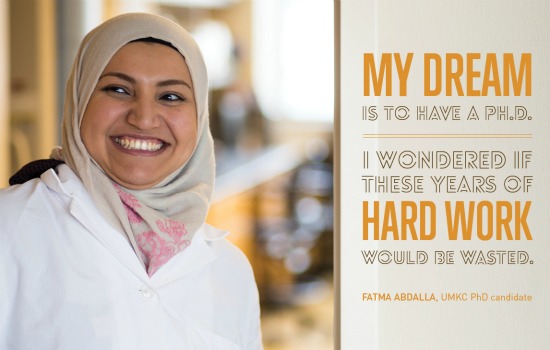
Abdalla literally didn’t believe the news until she couldn’t board her flight back Jan. 29. She talked to her family via the Internet. Her sons didn’t understand, but her daughter grasped the situation — she wanted to speak to the president. More tears.
“After being fearful about not knowing when I’d again get to see my family, I thought about my education,” she said. “My dream is to have a PhD. I wondered if these years of hard work would be wasted.”
Abdalla connected with people at UMKC, and received lots of emails, offering advice and encouragement. They put her in touch with civil organizations and groups that help students, and with U.S. Sen. Claire McCaskill.
“I got so much support from UMKC,” she said. “Everyone here tried to help in a different way. My adviser contacted Dean Melchert who was the first person who reached out.”
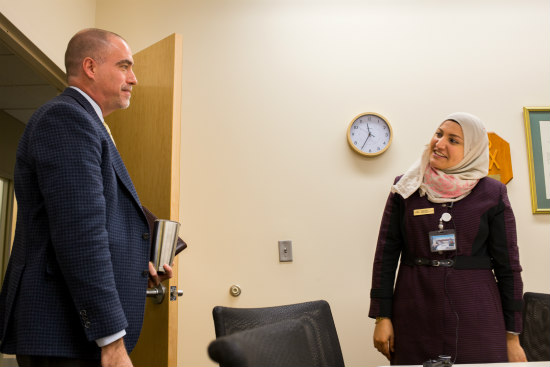
Russell Melchert, dean of the UMKC School of Pharmacy, welcoming Abdalla back to UMKC.
Abdalla returned from the airport in Tunisia to Libya — 600 miles away — and kept in touch with her family in Kansas City and glued to the news. State attorneys general sued the Trump administration in federal court, asking for a temporary nationwide restraining order blocking the ban. On Feb. 3, a Washington state district court judge suspended the ban nationwide with a temporary restraining order. Travel to the U.S. from affected countries resumed.
During the continuing days of court proceedings, Abdalla embarked on a two-day journey back to Kansas City. She traveled outside of banned countries to Turkey and then the U.S. She arrived Wednesday night, Feb. 8, at KCI Airport. Her husband, daughter and sons were waiting for her. They cried with joy.
“When I saw my family I was so thankful,” Abdalla said. “My kids kept saying thank you, mommy! Finally, they let you come home. I was able to be home in time for my daughter’s 7th birthday.”
A few days later, Abdalla returned to UMKC, where she was greeted with many hugs and kind words from those she knew and those she didn’t.
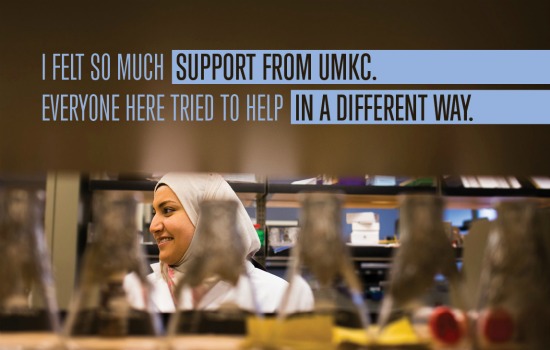
“Welcome back,” said Russell Melchert, dean of the School of Pharmacy. “We’re so happy to have you here.”
Abdalla is glad to be back in the lab researching. “I work on a novel Resveratrol analog that will make the lives of HIV patients better,” she said. She’s working on identifying the roles by which the Resveratrol analog could improve the neurodegeneration associated with HIV patients. She is testing this novel drug on human cells as well as on experimental animals. The successful completion of her research will have an almost immediate translational application for the treatment/prevention of HIV associated neurodegeneration.
She and her family want to return to Libya after she and her husband receive their degrees. But so much is unknown while the administration’s approach to immigration continues to evolve.
“Our future and our lives feel uncertain,” she said. “For now, we are happy we’re here together and for the support we have here.”

